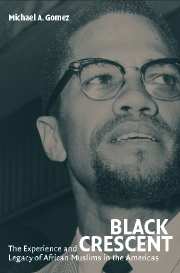Book contents
Epilogue
Published online by Cambridge University Press: 05 June 2012
Summary
Several aspects of the African and African-descended Muslim experience in the Americas stand out in sharp relief. To begin, the Old World context and set of circumstances molding and impacting Muslim life in Africa and Europe continued to inform conditions in the New World and clearly influenced the ways in which the colonial project unfolded. In what became Latin America, the conflicts and enmities and politics that had evolved for nearly 1,000 years in Iberia were not quickly or easily forgotten in fifteenth- and sixteenth-century Hispaniola, Costa Rica, Puerto Rico, Mexico, Panama, Venezuela, or elsewhere within Spanish-claimed domains. The gelofes (Senegambians) and mandingas (Mande-speakers), among whom were Muslims, were suspected of harboring sustained beliefs in and affiliations with Islam, and they did not disappoint. Rebellion frequently ensued in the sixteenth and seventeenth centuries, often taking the form of marronage. Attempts to bypass these challenges through the importation of ladinos were not always successful, as many ladinos were themselves Senegambian Muslims who had worked alongside the moriscos (purported Christian Moors) in Iberia, circumstances allowing for an acculturative process unanticipated by Christian authorities. When transported to the Americas where they were joined by other Senegambians, many of whom were Muslim, they sought escape from servility, thereby developing a reputation for recalcitrance and revolt. The view of the African Muslim was therefore established by the time Mande-speakers became the predominant representation of Muslims in Spanish-claimed lands into the eighteenth and nineteenth centuries, by which time the notion of mandinga had been infused with every negative and evil association.
- Type
- Chapter
- Information
- Black CrescentThe Experience and Legacy of African Muslims in the Americas, pp. 371 - 376Publisher: Cambridge University PressPrint publication year: 2005



